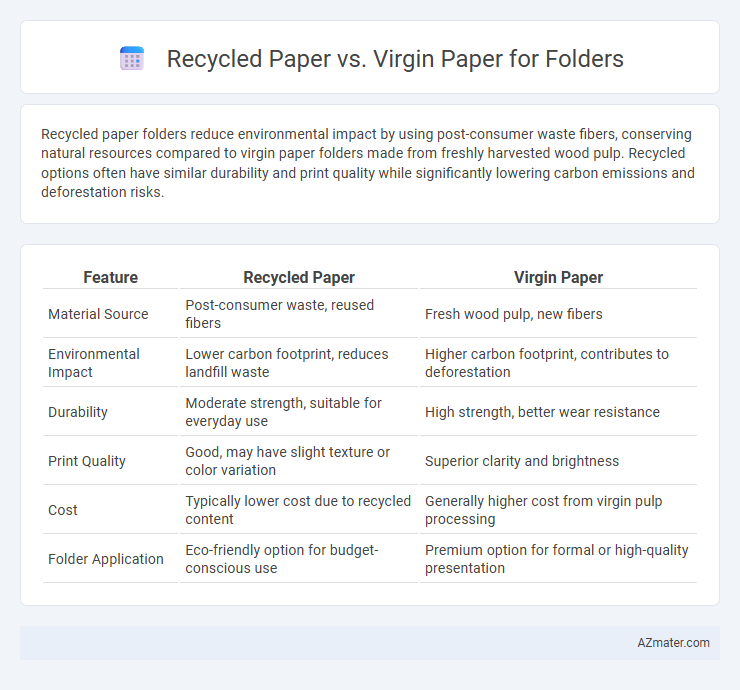Recycled paper folders reduce environmental impact by using post-consumer waste fibers, conserving natural resources compared to virgin paper folders made from freshly harvested wood pulp. Recycled options often have similar durability and print quality while significantly lowering carbon emissions and deforestation risks.
Table of Comparison
| Feature | Recycled Paper | Virgin Paper |
|---|---|---|
| Material Source | Post-consumer waste, reused fibers | Fresh wood pulp, new fibers |
| Environmental Impact | Lower carbon footprint, reduces landfill waste | Higher carbon footprint, contributes to deforestation |
| Durability | Moderate strength, suitable for everyday use | High strength, better wear resistance |
| Print Quality | Good, may have slight texture or color variation | Superior clarity and brightness |
| Cost | Typically lower cost due to recycled content | Generally higher cost from virgin pulp processing |
| Folder Application | Eco-friendly option for budget-conscious use | Premium option for formal or high-quality presentation |
Introduction: The Debate on Paper Choices for Folders
Choosing between recycled paper and virgin paper for folders involves evaluating environmental impact, quality, and cost. Recycled paper, made from post-consumer waste, significantly reduces deforestation and energy consumption compared to virgin paper, which is produced directly from fresh wood pulp. While virgin paper offers superior strength and smoothness, advancements in recycled paper technology have enhanced durability, making recycled folders a sustainable yet practical option for office and organizational use.
Environmental Impact: Recycled vs. Virgin Paper
Recycled paper folders significantly reduce deforestation and lower greenhouse gas emissions compared to virgin paper, which requires fresh timber and extensive water use. The production of recycled paper consumes up to 60% less energy and generates less landfill waste, enhancing sustainability in office supplies. Choosing recycled paper supports circular economy practices by minimizing ecological footprints associated with raw material extraction and processing.
Raw Material Sourcing and Sustainability
Recycled paper for folders primarily sources raw materials from post-consumer waste, reducing the demand for virgin wood fibers and minimizing deforestation impacts. Virgin paper relies on freshly harvested timber, leading to higher resource consumption and increased ecological footprint. Utilizing recycled paper supports circular economy principles and significantly lowers carbon emissions and water usage in production, enhancing overall folder sustainability.
Manufacturing Process Differences
Recycled paper for folders is manufactured by reprocessing used paper fibers through deinking, pulping, and cleaning, which reduces tree harvesting and energy consumption compared to virgin paper. Virgin paper production involves directly processing fresh wood pulp, requiring extensive mechanical and chemical treatments to break down raw timber into usable fibers. The recycled paper process typically emits fewer pollutants and consumes less water, making it more environmentally sustainable than the energy-intensive virgin paper manufacturing.
Quality Comparison: Durability and Appearance
Recycled paper folders often exhibit slightly lower durability compared to virgin paper folders due to fiber shortening during recycling, resulting in reduced tear strength and stiffness. Virgin paper folders maintain superior appearance with smoother surfaces and brighter colors, enhancing print clarity and professional look. However, high-quality recycled paper products have improved significantly, balancing sustainability with acceptable durability and aesthetic standards.
Cost Analysis: Which is More Economical?
Recycled paper for folders typically costs 10-30% less than virgin paper due to lower raw material and energy requirements during production. Virgin paper, made from fresh wood pulp, involves higher expenses in harvesting, processing, and bleaching, making it less economical for large-scale folder manufacturing. Businesses seeking cost-effectiveness and sustainability often prefer recycled paper, balancing budget constraints with eco-friendly practices.
Printing and Customization Capabilities
Recycled paper for folders offers excellent compatibility with most printing techniques, including digital, offset, and screen printing, ensuring vibrant colors and sharp images while supporting eco-friendly branding. Virgin paper provides a smoother surface ideal for high-resolution printing and intricate customization, delivering premium quality finishes such as foil stamping and embossing. Both materials support various customization options, but virgin paper typically enhances detail precision and color accuracy, making it preferable for luxury or highly detailed folder designs.
Certifications and Eco-Labels to Consider
Choose recycled paper folders certified by FSC Recycled or SCS Recycled Content to ensure sustainable sourcing and verify post-consumer content. Virgin paper folders should carry Forest Stewardship Council (FSC) or Programme for the Endorsement of Forest Certification (PEFC) labels, guaranteeing responsible forest management and minimal environmental impact. Look for certifications like Green Seal or EcoLogo to confirm low emissions and toxin-free production processes in both recycled and virgin paper options.
User Preferences and Industry Trends
User preferences increasingly favor recycled paper folders due to their environmental benefits and cost-effectiveness, with surveys indicating over 60% of office supply buyers prioritize sustainability. Industry trends show a significant rise in recycled paper production, driven by advancements in fiber processing technology that enhance durability and print quality comparable to virgin paper. Market analysis predicts a 10% annual growth rate for recycled paper folders, reflecting shifting corporate procurement policies and eco-conscious consumer demand.
Conclusion: Choosing the Right Paper for Folders
Selecting the right paper for folders depends on balancing environmental impact and durability, with recycled paper offering significant sustainability benefits due to reduced deforestation and lower energy consumption. Virgin paper provides superior strength and a smoother finish, often preferred for high-quality or long-lasting folders in professional settings. Evaluating folder usage, budget, and environmental goals ensures the optimal choice between recycled and virgin paper types.

Infographic: Recycled paper vs Virgin paper for Folder
 azmater.com
azmater.com